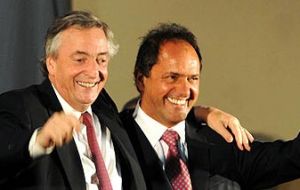MercoPress. South Atlantic News Agency
Kirchners desperate bid to retain power in mid term election
 Kirchner and Scioli the ticket to prevent (hopefully) the down fall
Kirchner and Scioli the ticket to prevent (hopefully) the down fall Former Argentine President Nestor Kirchner will run for a seat in Congress in a bid to bolster the ruling party in June 28 mid-term elections. The ballot is seen as referendum on the government of current president Cristina Fernández de Kirchner and her husband, Nestor Kirchner.
Kirchner heads the Peronist party but is widely seen as unofficially running the government alongside his wife, Cristina Fernandez, whose popularity has sunk due to economic woes and a prolonged tax war with farmers.
Kirchner will head a list of congressional candidates from his party in the major electoral battleground of Buenos Aires province, the region's governor, Daniel Scioli, said.
Mrs. Kirchner’s supporters hope his candidacy will strengthen the pro-government list of candidates running under Argentina's proportional representation system and help the Argentine leader keep her congressional majority.
A weak showing, analysts say, will leave his wife's government and the couple's political clout significantly weakened. Political uncertainty has heightened in Argentina ahead of the vote because of concerns that Mrs. Kirchner will be unable to govern effectively if her allies fare poorly.
Half of the 256-seat lower house and one third of 72 senators will be elected next month, and most opinion polls show Cristina Fernandez de Kirchner likely to lose her majority in the legislature.
In recent public appearances, Nestor Kirchner warned voters that if they did not support the ruling party Argentina could return to the political and economic chaos of 2001-2002, when bank deposits were frozen, the currency was devalued and the Argentine economy virtually melted contracting almost 30%.
Nestor Kirchner enjoyed high approval ratings during his 2003-2007 term in office, when he oversaw an economic rebound. There is speculation that he will seek the presidency again when his wife's term ends in 2011.
But Mrs. Kirchner has battled high inflation, a tax revolt by farmers, a looming debt financing crunch, complaints of high crime and waning support.
Argentine political analyst Rosendo Fraga said the political showdown with farmers was expected to cost the government significant numbers of votes in key areas of the interior of the country.
“It's clear the government will be left politically weaker to face a situation made more difficult by the global economic crisis,” he said.
Just weeks ago, Kirchner and his allies were leading the race in Buenos Aires province, where 35 seats in the lower house are up for grabs. Recent polls show a victory will be slim or elusive as candidates from a dissident faction of the Peronist party have gained ground.
If the Kirchner-led ticket is not the top vote-getter in the key province, it will be read as a devastating loss because it is one of the few areas of the country where he and his wife are still fairly popular.
Since taking office in December 2007, Mrs. Kirchner has increased state intervention in the economy and financial markets, taking over the private pension fund system and the main airline, and has been accused of distorting key economic data.
She failed to implement the cornerstone of her economic policy, a higher tax on exports of Argentina's biggest crop, soy, which she said she would use to distribute wealth from a recent commodities boom.




Top Comments
Disclaimer & comment rulesCommenting for this story is now closed.
If you have a Facebook account, become a fan and comment on our Facebook Page!